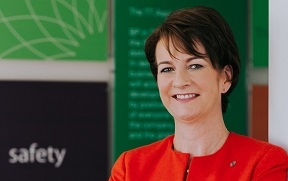
(bpTT, 8.Jun.2021) — bpTT’s Claire Fitzpatrick spoke at the Trinidad and Tobago Energy Conference. What follows is her full speech.
Good morning.
The future of the energy sector in Trinidad and Tobago is on everyone’s mind. If I were to sum up the challenge in one simple statement: There is a future, but we are in the midst of rapid and complex change.
The energy transition has already started however it is now also happening against the backdrop of a global pandemic. There are many priorities to balance; climate, economic, social and now more than ever society is demanding more from all of us.
Every country is grappling with post-pandemic economic recovery plans, including plans to produce, source and use energy in more sustainable ways. And companies are thinking about their own sustainability and risks and opportunities that these changes present.
So what’s driving the energy transition?
The world needs more energy but energy that is – reliable, affordable and clean.
Over the next 30 years, we see that global energy demand will continue to grow, driven by increased prosperity and living standards in the emerging world.
But…
The structure of energy supply will change. The role of fossil fuels will decline, offset by an increasing share of renewable energy and a growing role for electricity.
The momentum for change is building and stakeholders are demanding a new level of urgency.
On one hand we are in action – Since the Paris agreement, more than 100 countries have pledged to achieve net zero by 2050 or sooner with a shift from coal towards natural gas and the increasing role of renewables in the energy mix.
On the other hand – Shareholders and stakeholders are more impatient with the pace of change; demanding we go faster. That pressure is not just coming from environmental groups it is now also coming from the court rooms and the make-up of board rooms, as we have seen in recent weeks.
This movement has implications for both corporations and hydrocarbon producing countries.
So the question is; what do we need to do to take us through this transition?
We heard yesterday that gas will remain key. This is reassuring news.
But we also know that society is demanding energy that is cleaner.
This means that in the not too distant future our energy exports will come under increasing scrutiny in terms of their carbon footprint. Everyone in the value chain – upstream, downstream and I might add energy services providers – we
need to work together to reduce emissions from our operations and to decarbonize the gas value chain.
Trinidad as an energy exporter also needs to look at the potential energy exports of the future. Hydrogen, for example, could represent an opportunity for a new energy export commodity, broadening our energy export mix.
Then there is also the role of renewables. At a minimum, renewables used for domestic power frees up gas to be sold into export markets, which at higher value is just good business.
And beyond that there may still be potential for more integration of renewables into the local energy mix.
So how can we achieve this? In one word: collaboration.
Conferences such as these have been invaluable in bringing together a range of ideas, opinions and learnings. They have helped to provide an understanding of the challenges faced by the sector and scenarios for its future.
But we need to move from sharing ideas to developing firm plans.
Historically we have talked about a gas master plan, maybe there is need for an energy transition master plan that brings together input from private sector, government, academia, and civil society to chart a vision and pathways for navigating the transition. I know there is a lot of work already underway by government, companies, universities and the Chamber but the real “secret sauce” may be to find a way to pull this all together and have our energy and resources focused on the same common goal. Business as usual will not get us through the transition. We can see that the energy sector – in fact the world – will look very different by 2030. We need to broaden our thinking, and our collaboration but we also need to act.
I have offered some of my thoughts on the challenges we face in progressing through the energy transition. My fellow panelists may have different ideas and opinions about how we can achieve this – indeed I hope they do – as none of us
have all the answers. I believe it will require us working together to make Trinidad and Tobago competitive in the
changing world.
Thank you
____________________

